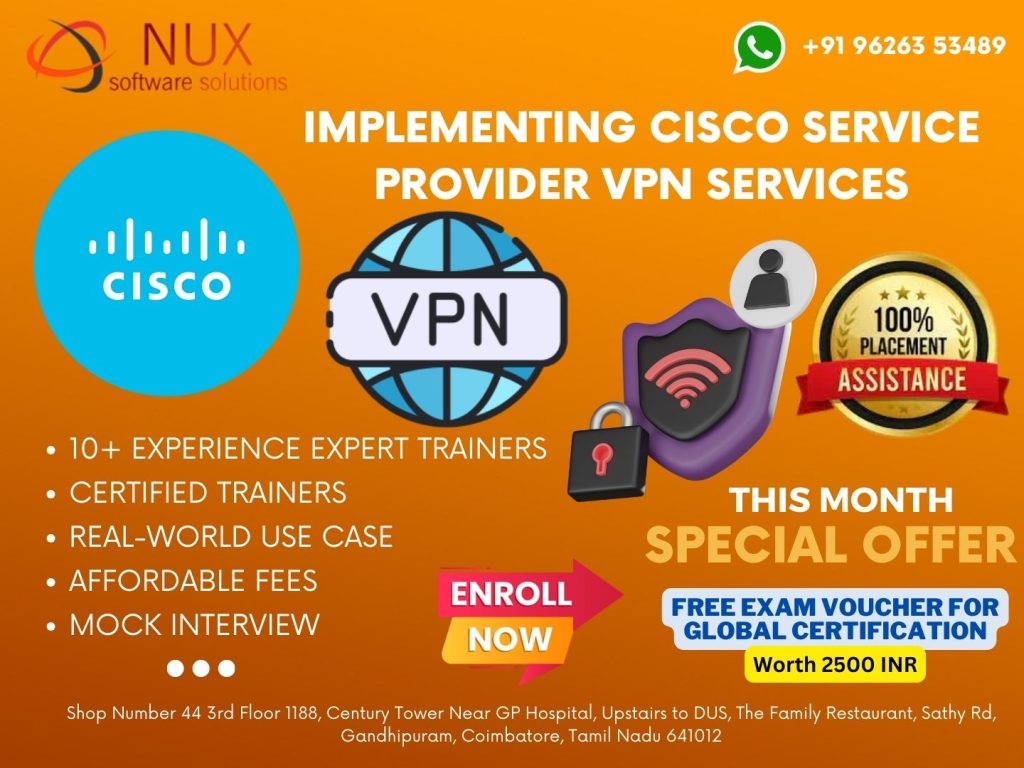Cisco Data Center Core Technologies (DCCOR) 350-601

Cisco DCCOR 350-601 Training in Coimbatore
(Implementing Cisco Data Center Core Technologies Certification)
Course Overview
The Cisco Data Center Core Technologies (DCCOR 350-601) course is the core exam required for achieving CCNP Data Center and CCIE Data Center certifications. This comprehensive training program equips learners with deep knowledge and practical skills in data center infrastructure, automation, security, storage networking, compute, and network management.
At Linux Training Center in Coimbatore, this course is delivered through hands-on labs, real-time enterprise scenarios, and expert-led sessions to help professionals build and manage scalable, secure, and efficient data center environments using Cisco’s NX-OS, UCS, and ACI platforms.
Why Choose DCCOR 350-601?
Data centers are the backbone of modern enterprise IT. As businesses move towards virtualization, hybrid cloud, and automation, the demand for skilled data center professionals continues to rise. The DCCOR 350-601 certification validates your expertise in operating core technologies that power today’s enterprise data centers, making you a highly valuable asset in both enterprise and service provider environments.
This course emphasizes next-gen technologies including Cisco Application Centric Infrastructure (ACI), policy-driven automation, software-defined networking (SDN), and secure virtualization.
Who Should Enroll?
This course is ideal for:
Data Center Engineers and System Administrators
Network and Infrastructure Engineers working in large-scale data center environments
IT professionals aiming for CCNP or CCIE Data Center certification
Engineers responsible for deploying Cisco UCS servers, Nexus switches, and SANs
Anyone seeking advanced skills in data center architecture, security, and automation
Basic knowledge of networking and data center concepts is recommended.
What You Will Learn
Data center architecture, components, and best practices
Implementation and management of Cisco Nexus Series Switches
Configuration of Cisco UCS (Unified Computing System) for compute resources
Advanced network virtualization and overlays using VXLAN
Automation with Cisco DCNM, Python, REST APIs, and Ansible
Fundamentals of Cisco ACI (Application Centric Infrastructure)
Implementing security controls, segmentation, and monitoring
Configuration and optimization of storage area networks (SAN)
Orchestration and management of virtualized resources
Troubleshooting and monitoring tools in the Cisco Data Center portfolio
You will also gain hands-on experience working with real and simulated Cisco gear, including Nexus 9000 switches, UCS Manager, and ACI Fabric.
Course Highlights
Delivered by Cisco-certified instructors with real-world DC experience
Lab-intensive training with industry-grade equipment and simulators
Prepares you for the DCCOR 350-601 certification exam
Updated as per the latest Cisco exam blueprint
Available in both classroom and live online formats
Certification path toward CCNP and CCIE Data Center credentials
Career Opportunities
Completing the DCCOR course opens doors to advanced roles such as Data Center Network Engineer, Systems Engineer, Cisco UCS Administrator, Infrastructure Architect, and Cloud Data Center Specialist. It is also a prerequisite for the CCIE Data Center written exam, placing you on the elite path of Cisco-certified experts.
Why Linux Training Center, Coimbatore?
At Linux Training Center, we combine expert instruction with hands-on practice and a focus on job readiness. Our DCCOR program is designed to help you master data center technologies and gain confidence to pass Cisco’s challenging exams and perform at a high level in real-world IT environments.
Cisco Data Center Core Technologies (DCCOR) 350-601 Syllabus
Network - 25%
1. Apply routing protocols
- OSPFv2 and OSPFv3, MP-BGP, PIM, FHRP
2. Apply switching protocols such as RSTP+, LACP and vPC
3. Apply overlay protocols such as VXLAN EVPN and OTV
4. Apply ACI concepts
- Fabric setup, Access policies, VMM
5. Analyze packet flow (unicast, multicast, and broadcast)
6. Describe Cloud service and deployment models (NIST 800-145)
7. Describe software updates and their impacts
- Disruptive / nondisruptive, EPLD, Patches
8. Implement network configuration management
9. Implement infrastructure monitoring such as NetFlow and SPAN
10. Explain network assurance concepts such as streaming telemetry
11. Describe the capabilities and features of Nexus Dashboard
Compute - 25%
1. Implement Cisco Unified Compute System Rack Servers
2. Implement Cisco Unified Compute System Blade Chassis
- Initial setup, Infrastructure management, Network management (VLANs, pools and policies, templates, QoS), Storage management (SAN connectivity, Fibre Channel zoning, VSANs, WWN pools, SAN policies, templates), Server management (Server pools and boot policies)
3. Explain HyperFlex Infrastructure Concepts and benefits (Edge and Hybrid Architecture vs all-flash)
4. Describe firmware and software updates and their impacts on B-Series and C-Series servers
5. Implement compute configuration management (Backup and restore)
6. Implement infrastructure monitoring such as SPAN and Cisco Intersight
Storage Network - 20%
1. Implement Fibre Channel
- ⦁ Switch fabric initialization
⦁ Port channels
⦁ FCID
⦁ CFS
⦁ Zoning
⦁ FCNS
⦁ Device alias
⦁ NPV and NPIV
⦁ VSAN
2. Implement FCoE Unified Fabric
3. Describe NFS and NAS concepts
4. Describe software updates and their impacts (Disruptive/nondisruptive and EPLD)
5. Implement infrastructure monitoring
Automation - 15%
1. Implement automation and scripting tools
- ⦁ EEM
⦁ Scheduler
⦁ Bash Shell and Guest Shell for NX-OS
⦁ REST API (NX-API, JSON and XML encodings)
⦁ On-box Python
2. Evaluate automation and orchestration technologies
-
⦁ Ansible
⦁ Python
⦁ POAP
⦁ Cisco Nexus Dashboard Fabric Controller
⦁ PowerShell
⦁ Terraform
Security - 15%
1. Apply network security
-
⦁ AAA and RBAC
⦁ ACI contracts and microsegmentation
⦁ First-hop security features
⦁ Keychain authentication
- AAA and RBAC
3. Apply storage security
⦁ AAA and RBAC
⦁ Port security
⦁ Fabric binding



